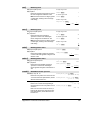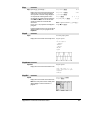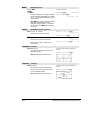
Appendix A: Functions and Instructions 805
A non-real guess is often necessary to determine
a non-real zero. For convergence, a guess might
have to be rather close to a zero.
cZeros({
e
^(z_)ìw_,w_ìz_^2},
{w_,z_=1+
i
}) ¸
[]
.149…+4.89…ø
i
1.588…+1.540…ø
i
d
() 2=key or MATH/Calculus menu
d
(
expression1
,
var
[,
order
]) ⇒
⇒⇒
⇒
expression
d
(
list1,var
[,
order
]) ⇒
⇒⇒
⇒
list
d
(
matrix1,var
[,
order
]) ⇒
⇒⇒
⇒
matrix
Returns the first derivative of
expression1
with
respect to variable
var
.
expression1
can be a list or
a matrix.
order
, if included, must be an integer. If the order
is less than zero, the result will be an anti-
derivative.
d
() does not follow the normal evaluation
mechanism of fully simplifying its arguments and
then applying the function definition to these fully
simplified arguments. Instead,
d
() performs the
following steps:
1. Simplify the second argument only to the
extent that it does not lead to a non-
variable.
2. Simplify the first argument only to the extent
that it does recall any stored value for the
variable determined by step 1.
3. Determine the symbolic derivative of the
result of step 2 with respect to the variable
from step 1.
4. If the variable from step 1 has a stored value
or a value specified by a “with” (|) operator,
substitute that value into the result from
step 3.
d
(f(x)ù g(x),x) ¸
d
d
x
(f(x))ø g(x) +
d
d
x
(g(x))ø f(x)
d
(
d
(x^2ù y^3,x),y) ¸ 6øyñøx
d
(x^2,x,ë 1) ¸
xò
3
d
({x^2,x^3,x^4},x) ¸
{2ø x 3øxñ 4ø xò}
data4
44
4mat CATALOG/MATH/List menu
data4
44
4mat
data,mat
[,row1] [,col1] [,row2] [,col2]
Converts data to a matrix.
Each argument
[,row1][,col1][,row2] [,col2] can
be individually omitted. If
row1
is omitted the
default is 1. If
col1 is omitted the default is 1. If
row2 is omitted, the default is “max row.” If col2
is omitted, the default is “max column.”
The DATA structure allows empty cells. Rows do
not have to be equal size. When data is saved as
a matrix, empty cells will be populated with
“undef.”
data4mat d1,m1,1, , ,1 ¸
Done
dayOfWk() CATALOG
dayOfWk(
year,month,day
) ⇒
⇒⇒
⇒
integer
Returns an integer from 1 to 7, with each integer
representing a day of the week. Use
dayOfWk()
to determine on which day of the week a
particular date would occur.
Note: May not give accurate results for years
dayOfWk(1948,9,6) 2
Integer values:
1 = Sunday
2 = Monday


















